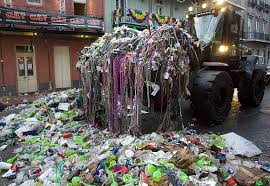
someone's gotta clean up all this mess
Wed 2020-06-24 22:38:33 (in context)
- 34 words (if poetry, lines) long
Wow, I suck at this Social Media Self-Promotion thing. I keep forgetting to tell you about my latest poem publication. It's "The Mardi Gras Tree," and you can read it in the very latest edition of Eternal Haunted Summer--the Summer Solstice 2020 issue, whose theme is "Holy Days."
The holy day being commemorated in "The Mardi Gras Tree" is, as you might expect, Fat Tuesday. But it's not about the day of festival and celebration so much as it is about the hangover and mundane clean-up duty of the afternoon after the parades have all passed by, and the morning after when it's time to get back to work. The transition from one to the other happens much sooner than you might think. New Orleans natives know how the unofficial final floats in any parade are the police cars whoop-whooping at spectators to let them know the show's over, and after that the huge street-cleaning trucks with the round brushes and the jets of water scouring the street. Many a child raised in the area knows better than to leave before those vehicles show up--it ain't over until it's over, after all--and many a parent disappoints their kid by yanking them away before that happens--gotta get to the car and vacate your parking spot ahead of everyone else, for fear of having to sit bored in your car waiting for your turn to leave.
(That latter impulse I see at concert venues, with drivers fleeing after the last song proper but before the encore so as to spare themselves the inevitable traffic jam.)
I really like what editor Rebecca Buchanan has to say about my poem: that it illustrates "just how hard it can be to leave sacred space and return to mundane reality." I hadn't thought of it that way--Mardi Gras as sacred space--I'd thought of it more as a drunken Bacchanalia out of which we stumble blearily with a hangover and a certain dread of being confronted with whatever stupid shit we did while the rules of society were temporarily suspended. But that suspension of rules really is a liminal zone, a place where reality is on hold, a "time that is not a time, a place that is not a place" as we Wiccans often say about the magic circles we construct for the purpose of ritual. It was quite normal for a kid growing up in the area to have the entire week of Fat Tuesday off, which made it that much harder to return to everyday life the following week.
(Many of my friends and their families used the week to head up to Colorado ski resorts, a choice I found baffling. Why, I thought, would anyone leave New Orleans during the week of Mardi Gras? Didn't they know Mardi Gras was the best time to be a New Orleanian? Now, ironically enough, I'm in Colorado full time. I still haven't really learned to ski, though.)
Anyway, thanks to such neighborhood monuments as the titular crepe myrtle tree on Bonnabel Boulevard--and I'm sure there are landmark trees like it all over the Greater New Orleans Area; that's just the one maintained in my particular stomping grounds in Metairie--pieces of sacred space celebrate Fat Tuesday all year round. Come spring and summer, they rain petals and pollen down on unsuspecting passersby while their perennial plastic fruit clinks and clatters. "Throw me something, Mister." There are also the barely hopeful idiots in the French Quarter who'll half-heartedly offer anyone presenting as female a string of cheap beads if she should "take it off" and "show your tits"; I guess they're part of the year-round ritual space of carnival, too. I prefer the trees.
I wrote "The Mardi Gras Tree" this year as part of a Codex contest called "Victory in Verse." The contest ran four weeks. The first week called for short poems, twenty lines or less, which were otherwise unrestricted. During the second week, we wrote short formal verse. The third week was all about visual poetry: erasure poems, concrete poetry, found poetry, and other experiments. And the fourth week, dubbed "Take your best shot" (although I seem to persist in misremembering it as "Do Your Verse") featured whatever the hell you wanted to do at whatever length you chose.
The contest facilitator gave us a lot of prompts to spark contestants' imaginations, both pictoral and verbal. One of them was the photo I've included here. Given where I'm from, it was inevitable that it would catch my eye. Thus was born my poem "The Mardi Gras Tree," which I'm so proud to see featured in Eternal Haunted Summer, and so pleased now to share with you.